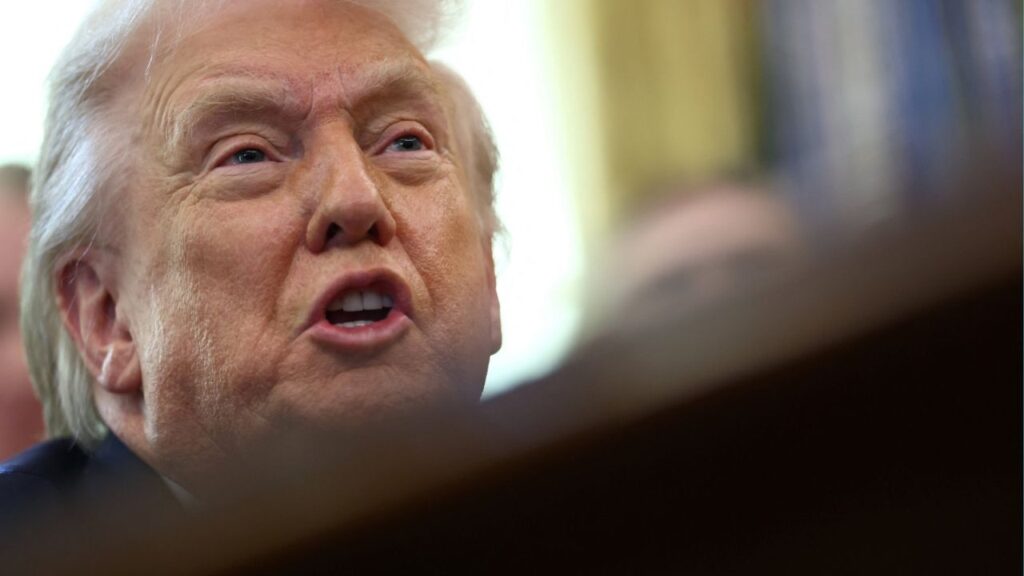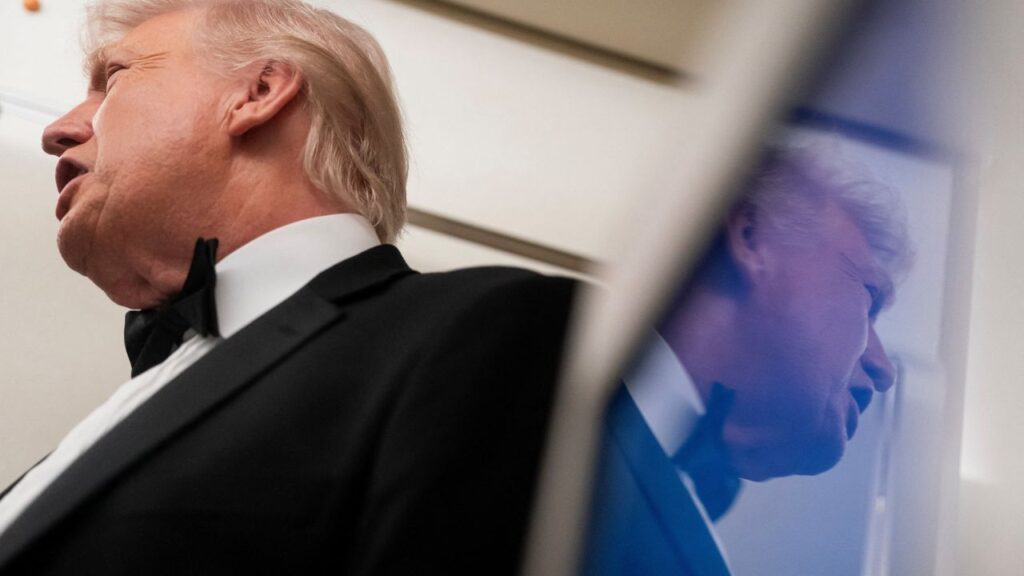Share
The latest developments on the Russia-Ukraine war:
KYIV, Ukraine — In a bitter and emotional speech, Ukraine President Volodymyr Zelenskyy criticized NATO for refusing to impose a no-fly zone over Ukraine, saying it will fully untie Russia’s hands as it escalates its attack from the air.
“All the people who die from this day forward will also die because of you, because of your weakness, because of your lack of unity,” he said in a nighttime address. “The alliance has given the green light to the bombing of Ukrainian cities and villages by refusing to create a no-fly zone.”
On Friday, NATO refused to impose a no-fly zone, warning that to do so could provoke widespread war in Europe with nuclear-armed Russia.
“All that the alliance was able to do today was to pass through its procurement system 50 tons of diesel fuel for Ukraine. Perhaps so we could burn the Budapest Memorandum,” Zelenskyy said, referring to the 1994 security guarantees given to Ukraine in exchange for the withdrawal of its Soviet-era nuclear weapons.
“You will not be able to pay us off with liters of fuel for the liters of our blood, shed for our common Europe.”
He said Ukrainians will continue to resist and have already destroyed Russia’s plans for a lightning invasion “having endured nine days of darkness and evil.”
“We are warriors of light,” he said. “The history of Europe will remember this forever.”
US Embassy Calls Attack on Nuclear Plant ‘War Crime’
KYIV, Ukraine — The U.S. Embassy in Ukraine is calling Russia’s attack on a nuclear plant a war crime.
“It is a war crime to attack a nuclear power plant,” the embassy statement said. “Putin’s shelling of Europe’s largest nuclear plant takes his reign of terror one step further.”
Russian troops seized the plant Friday in an attack that set it on fire and briefly raised fears of a nuclear disaster. The blaze was extinguished and no radiation was released.
Ukrainian President Volodymyr Zelensky called Russia’s action “nuclear terrorism” and appealed to the U.N. Security Council for action to safeguard Ukraine’s endangered nuclear facilities.
Zelenskyy Will Talk to US Senators on Saturday: Source
WASHINGTON — Ukrainian President Volodymyr Zelenskyy will talk to U.S. senators on a video conference call Saturday morning, according to a person familiar with the invitation from the Ukrainian embassy.
All senators are invited to the call, according to the person, who requested anonymity to discuss the private invitation. The meeting will be the first time lawmakers have talked to the Ukrainian president since Russia invaded his country.
The call will come as Congress is considering a request for $10 billion in emergency funding, with money going toward humanitarian aid and security needs in the war-torn country. Approval could come as soon as next week.
Putin: Russian Demands Must Be Met to End War
MOSCOW — President Vladimir Putin says Russia is ready for talks with Ukraine but insisted that it must meet Moscow’s demands.
Putin told German Chancellor Olaf Scholz that Ukraine must agree to demilitarize, accept Moscow’s sovereignty over Crimea and surrender territory to Russia-backed rebels in the east, the Kremlin said in its readout of Friday’s call.
Russia annexed Ukraine’s Crimean Peninsula in 2014 following the ouster of the country’s former Moscow-friendly leaders and cast its support behind the rebels in eastern Ukraine.
Putin recognized the separatist “people’s republics” as independent states just before he launched an invasion of Ukraine on Feb. 24, citing their plea for military assistance.
Russian and Ukrainian negotiators on Thursday held the second of two rounds of talks, reaching a tentative agreement on setting up safe corridors to allow civilians to leave besieged Ukrainian cities and the delivery of humanitarian supplies. They also agreed to keep talking on ways to negotiate a settlement, but Putin’s tough demands make prospects for a compromise look dim.
Ukrainian negotiators said the parties may conduct another round of talks over the weekend.
Ukrainian Hackers Target Russian Military Targets
KYIV, Ukraine — A top Ukrainian cybersecurity official says a volunteer army of hundreds of hackers enlisted to fight Russia in cyberspace is only attacking what it deems military targets, prioritizing government services including the financial sector, Kremlin-controlled media, and railways.
Victor Zhora, deputy chair of the state special communications service, also said Friday that there had been about 10 hostile hijackings of local government websites in Ukraine to spread false text propaganda saying his government had capitulated. He said most of Ukraine’s telecommunications and internet were fully operational.
Zhora told reporters in a teleconference that presumed Russian hackers continued to try to spread destructive malware in targeted email attacks on Ukrainian officials and – in what he considers a new tactic – trying to infect the devices of individual citizens.
Zhora said one job of civilian volunteer hackers is to try to obtain intelligence that can be used to attack Russian military systems. He said volunteers from Ukraine’s IT sector are also addressing the Russian people directly with phone calls, emails, and text messages. That includes sending videos and pictures of dead Russian soldiers.

Ukrainians Get Married Amid Explosions
KYIV, Ukraine — As occasional explosions sounded on the fringes of Kyiv, a young couple held their wedding ceremony on Friday.
Dmytro Shybalov and Anna Panasyk smiled and blushed in shy delight at the civil registry office where they married. The day was an eerie echo of when they fell in love in 2015 in Donetsk amid the fighting between separatists and Ukrainian forces that was a precursor to the countrywide war.
“It’s 2022 and the situation hasn’t changed. It’s scary to think what will happen when our children will be born,” Shybalov said.
Major Automotive Makers Halt Production in Russia
Toyota, Mercedes-Benz, Volkswagen, Renault, Hyundai, and Stellantis all halted production in Russia, with many saying they had run short of parts.
The war also forced automakers such as BMW and Volkswagen to cut production or shut down European factories due to a global shortage of computer chips, and because some of their parts came from Ukraine.
Many wouldn’t specify which parts are missing, but Volkswagen said it gets electrical wiring harnesses and numerous interior switches from Ukraine. In the auto business, one missing part can halt production.
Stellantis CEO Carlos Tavares said Friday that the company closed a plant near Moscow that it jointly operates with Mitsubishi due to sanctions and lack of parts. “The supply chain is completely disrupted,” he told reporters.
The rest of the company, he said, has not been affected yet because it generally doesn’t get parts from Eastern Europe.
If the war continues, though, more auto plants could close if companies find that some of their European parts suppliers get smaller components from Ukraine or Russia.
“I’m not excluding that because I know that with a longer pipe you can discover things a few days, if not a few weeks later,” said Tavares, who leads the world’s fourth-largest automaker. “I will need a couple of more weeks to see if something pops up, but so far it’s OK.”
White House Sends VP Harris to Poland, Romania
WASHINGTON — The White House announced Friday that U.S. Vice President Kamala Harris will travel to Poland and Romania next week to meet with officials to discuss the Russian invasion of Ukraine and impact the war is having on the region.
Harris’ agenda for the March 9 to 11 visit to Warsaw and Bucharest is expected to center on economic, security and humanitarian assistance for Ukraine.
“The Vice President’s meetings will also focus on how the United States can further support Ukraine’s neighbors as they welcome and care for refugees fleeing violence,” said the vice president’s deputy press secretary Sabrina Singh.
President Joe Biden spoke on Friday with Poland’s President Andrzej Duda.
Poland is assisting about 700,000 Ukrainians and others who have fled the war so far. The United States has also more than doubled its military presence in Poland, which is a member of NATO, to 9,000 troops in recent weeks.
1.2 Million People Have Fled Ukraine
GENEVA — The U.N. refugee agency reported Friday that more than 1.2 million people have left Ukraine since the fighting began.
More than 165,000 people left the country on Thursday — down slightly from Wednesday’s count and well under the nearly 200,000 on Tuesday, which amounted to the peak one-day outflow of people from Ukraine since the conflict began, according to the United Nations High Commissioner for Refugees.
Its data portal on Ukraine showed that the majority — about 650,000 — had gone to neighboring Poland, and roughly 145,000 had fled to Hungary. Another 103,000 were in Moldova and more than 90,000 in Slovakia.
UNHCR spokesperson Shabia Mantoo said “we know that the majority are women, children and the elderly,” but she was unable to provide a more specific breakdown by age or gender.
UN: 331 Deaths, 675 Injuries
GENEVA — The U.N. human rights office, in its latest count of casualties released Friday afternoon, said it had confirmed 331 people killed and 675 people injured since the beginning of the Russian invasion.
The rights office uses strict methodology and only reports casualties it has confirmed. It believes the real figures are much higher. Ukrainian officials have presented far higher numbers.

London Dockhands Refuse to Unload Russian Tankers
LONDON — A union says dockers at a British port have refused to unload gas tankers from Russia, and called for tighter sanctions to prevent Russian cargoes arriving in the U.K.
The Unison union says two tankers, Boris Vilkitsky and Fedor Litke, were diverted from Europe’s largest liquefied natural gas terminal on the Isle of Grain in southeast England.
The union said the British government must close a loophole that meant the cargo could return if it was loaded onto non-Russian vessels.
Britain has banned Russia-linked ships from its ports, but the union’s head of energy, Matt Lay, said the rules “only cover the ownership and operators of vessels, not the cargo.” He said “companies are free to get around the rules by hiring ships from other countries to import Russian goods.”
British Prime Minister Boris Johnson has called for Western countries to stop buying Russian oil and gas, but it is still being bought by many countries, including the U.K.
Danish Brewer Stops Russian Investments, Exports
COPENHAGEN, Denmark — Danish brewer Carlsberg said Friday that it was immediately stopping new investments and exports to Russia.
The group’s CEO Cees ‘t Hart said the stop also includes exports from other Carlsberg Group companies to Baltika Breweries in Russia.
“We will respect all applicable sanctions being put in place and continue to assess the situation in relation to our business in Russia,” he said in a statement to The Associated Press.
Carlsberg has 8,400 employees across Russia.
The group was “deeply shocked by the terrible events unfolding in Ukraine” and “strongly condemn the acts of violence and aggression,” he said, adding the brewer had taken several actions to ensure the safety and well-being of its 1,300 staff in Ukraine. On top of that, Carlsberg will donate 75 million kroner ($11.2 million) to the relief efforts in Ukraine.
Japan Condemns Russian Attack on Nuclear Plant
TOKYO – Japan’s Prime Minister Fumio Kishida has condemned Russia’s attack on Europe’s largest nuclear power plant in Ukraine, calling it “unforgivable reckless act.”
Kishida said he talked on the phone with Ukrainian President Volodymyr Zelenskyy and told him that “Russian attack on the nuclear plant was an unforgivable reckless act.”
Russian forces shelled Europe’s largest nuclear power plant Thursday, causing a fire there that was extinguished overnight but sparking global fear of radiation leaks. The International Atomic Energy Agency, the United Nation’s nuclear watchdog, says there was no sign on Friday of radiation leaks.
A massive earthquake and tsunami in March, 2011 destroyed power and cooling systems at the Fukushima Daiichi nuclear power plant, causing its triple meltdowns, spewing large amounts of radioactive materials in its surroundings and keeping part of the region still uninhabitable.
Russians Face 15 Years in Prison for ‘Fake News’
MOSCOW — Russians could face prison sentences of up to 15 years for spreading information that goes against the Russian government’s position on the war in Ukraine, a move that comes as authorities block access to foreign media outlets.
The Russian parliament voted unanimously Friday to approve a draft law criminalizing the intentional spreading of what Russia deems to be “fake” reports.
Russian authorities have repeatedly decried reports of Russian military setbacks or civilian deaths in Ukraine as “fake” reports. State media outlets refer to Russia’s invasion of Ukraine as a “special military operation” rather than a “war” or “invasion.”
State news agencies said the draft law was approved by the lower and upper houses of parliament in quick succession. It could be signed into law by President Vladimir Putin and take effect as soon as Saturday, the speaker of the lower house, Vyacheslav Volodin, said
The blocks affect the BBC, the U.S. government-funded Voice of America and Radio Free Europe/Radio Liberty, German broadcaster Deutsche Welle, and Latvia-based website Meduza. Together, they are among the most influential and often critical foreign media publishing in Russian.
NATO Leader Opposes No-Fly Zone
BRUSSELS – NATO Secretary-General Jens Stoltenberg says the military organization will not police a no-fly zone over Ukraine and is warning that such a move could end in a widespread war in Europe.
Speaking Friday after chairing a meeting of NATO foreign ministers, Stoltenberg said “we are not going to move into Ukraine, neither on the ground, nor in the Ukrainian airspace.”
Russian President Vladimir Putin’s forces have ramped up their attacks in Ukraine, launching hundreds of missiles and artillery strikes on cities and making significant gains in the south.
Ukrainian President Volodymyr Zelenskyy has appealed to the West to enforce a no-fly zone over his country, most recently after a fire overnight at one of Ukraine’s nuclear plants, the largest in Europe.
“The only way to implement a no-fly zone is to send NATO fighter planes into Ukrainian airspace, and then impose that no-fly zone by shooting down Russian planes,” Stoltenberg said. “We understand the desperation, but we also believe that if we did that, we would end up with something that could end in a full-fledged war in Europe.”
“We have a responsibility as NATO allies to prevent this war from escalating beyond Ukraine,” he said.
There’s a Push to Prosecute Putin as a War Criminal
LONDON — The Ukrainian government and a former British prime minister are pushing for a special criminal tribunal to prosecute Russian President Vladimir Putin and his allies over the invasion of Ukraine.
Former Prime Minister Gordon Brown said the call for a body to investigate the “crime of aggression” was based on the tribunals that prosecuted senior Nazis after World War II.
The Netherlands-based International Criminal Court is already investigating allegations that Russia has committed war crimes in Ukraine. But while it can investigate genocide, crimes against humanity, and war crimes, Russia has not signed up to a separate ICC statute under which nations pledge not to commit “crimes of aggression.”
Brown said that “this act of aggression by Russia … cannot go uninvestigated, unprosecuted and unpunished.”
He said the Russian president “must not be able to escape justice.”
Ukrainian Foreign Minister Dmytro Kuleba welcomed the call for a tribunal, which is backed by legal experts and academics from around the world.
“We are fighting against an enemy who is much stronger than us. But international law is on our side,” Kuleba told a meeting in London by video link from Ukraine.

Japan Sends Military Equipment to Ukraine
TOKYO — Japan is sending bulletproof vests, helmets, and other defense supplies to Ukraine to help the country fight Russia’s invasion.
It is a rare move by Japan, which has a principle of not shipping defense supplies to countries in conflict.
Chief Cabinet Secretary Hirokazu Matsuno told reporters Friday that shipping and other logistical details are being finalized after a decision by the National Security Council.
Bulletproof vests, helmets, tents, as well as generators, food, winter clothes and medical supplies will be delivered by Self-Defense Force aircraft, Matsuno said.
The planned shipment comes after a request from Ukraine. Japan, because of its pacifist principles, is supplying only non-lethal goods, Matsuno said.
“(Russia’s) unilateral change of status quo by force, which is absolutely unallowable, is an act that shakes the foundation of international order,” he said. “International society is sticking together and taking unprecedented steps to support Ukraine.”
Poland Arrests Suspected Spy
WARSAW, Poland — Polish security services say they have arrested a Spanish citizen on suspicion of spying for Russia.
Security services spokesman Stanislaw Zaryn said the man, who was born in Russia but holds a Spanish passport, was arrested on the night of Feb. 27 at a hotel in Przemysl, in southeastern Poland, and had journalist status.
Przemysl, near Poland’s border with Ukraine, is one of the main points where hundreds of thousands of Ukrainian refugees arrive as they flee Russia’s invasion.
Also, thousands of additional U.S. troops recently deployed to Poland to strengthen NATO’s eastern flank are stationed in the area.
The man allegedly was collecting information that was sensitive to Poland’s security and defense, Zaryn told The Associated Press.
The man is accused of spying for Russia. If convicted, he could get up to 10 years in prison.
No Radiation Released From Struck Nuclear Plant
VIENNA — The head of the UN atomic agency says a Ukrainian nuclear plant was hit by a Russian “projectile” but that the building it struck was a training center and there has been no release of radiation.
Initial reports were unclear about what part of the plant was affected by a fire that broke out after the shelling late Thursday, amid Russia’s invasion of Ukraine.
International Atomic Energy Agency Director-General Rafael Mariano Grossi said Friday that the building was “not part of the reactor.”
He said Ukrainians are still in control of the reactor and the fire has been extinguished.
The Ukrainian state nuclear company said three Ukrainian troops were killed and two wounded in the Russian attack.
The UN says only one reactor at the plant is operating, at about 60% of capacity.

Russians Block International Websites
MOSCOW — Russia’s state media regulator Roskomnadzor is blocking access to the websites of five international media organizations.
State news agency RIA Novosti reported Friday that the blocked websites include those of the BBC, Voice of America, and Radio Free Europe/Radio Liberty.
The sites were blocked for hosting what Roskomnadzor told RIA was “false information” about Russian military actions in Ukraine, including reports of attacks on civilians and the Russian military’s losses.
The five named organizations, also including Latvia-based Russian-language website Meduza and German broadcaster Deutsche Welle, are among the largest foreign news outlets with Russian-language news operations.
On the early afternoon in Moscow, the BBC Russian service and Radio Free Europe Russian-language content were not reachable, but Voice of America content remained accessible.
500,000 Children Among Ukrainian Refugees: UN
BERLIN — UNICEF says that about 500,000 children have been forced to flee their homes in Ukraine over the past week due to Russia’s invasion, calling the exodus “unprecedented in scale and speed.”
“If the violence (doesn’t) stop, many, many more children will be forced to flee their country in a very short space of time,” James Elder, a spokesman for the United Nations Children’s Fund, said Friday. “And we fear many more will be killed.”
He said UNICEF is sending large amounts of humanitarian supplies to Ukraine to help those in need and also providing emergency training to pediatricians who are being sent to the region.
“They’re preparing for a mass casualty of children,” he said, adding that the training included a triage system for treating children.
The International Organization for Migration said Friday that so far 1.25 million people have fled Ukraine, including almost 80,000 third-country nationals.
Google Suspends Online Ads in Russia
LONDON — Google is suspending sales of online ads in Russia after the country’s communications regulator demanded the tech giant stop spreading through its advertising what Moscow called false information about the Russian military in Ukraine.
The company said late Thursday that the suspension covers YouTube, search and display ads.
Google is one of the world’s biggest sellers of online ads.
The Russian regulator, Roskomnadzor, issued several notices to Google this week warning the company about spreading false information or demanding it ease restrictions on YouTube channels operated by Russian media.
Separately, Airbnb CEO Brian Chesky tweeted that the short-stay booking site is suspending all operations in Russia and its neighboring ally Belarus. Chesky did not elaborate.
RELATED TOPICS:
Categories

Teen Arrested at Visalia Mall After Firearm Report

Tumblr Goes Down for Thousands, Downdetector Reports
















